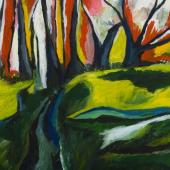GDR Literature
It is still discussed in Germany, whether the literature of the GDR can be accepted as independent. However, since the perception of the literary world was that different just at the beginning of the division of Germany, one need to attach its own reality-topic to the GDR literature. We highlight the era and its literati in the context of the so-called "socialist realism" of the former GDR.
After the Second World War, many writers came back to Germany from Nazi exile and to the Soviet occupation zone "German Democratic Republic". Leftist authors of the Weimar Republic as Anna Seghers, Bertolt Brecht, Arnold Zweig and Johannes R. Becher laid the foundation of GDR's own literature and enjoyed great recognition. Important issues of the so-called construction literature in the first years after 1945 were the confrontation with the war and fascism, and the definition of the task of literature. The writers in the GDR had a social responsibility from the beginning on. They should show the readers through examples, which paths led to economic success and how the class struggle works.
In the 1960s, the arrival literature marked the literary image of the GDR. After the construction of the Wall in 1961, many authors turned to the everyday living conditions in the GDR. Characteristic for the novels of this period is usually a young hero who comes into conflict with the socialist living conditions, but eventually turns to them again and arrives in socialism. The arrival novels of this period are developmental and educational novels. The most famous examples are the novels "Ankunft im Alltag" by Brigitte Reimann and "Divided Heaven" by Christa Wolf. Lyrical representatives of this time were Wolf Biermann, Volker Braun, Sarah Kirsch or Reiner Kunze.
The end of the era Walter Ulbricht, who was replaced by Erich Honecker in 1971, heralded a turning point in politics of the GDR and led to a liberalization in literature. The singer-songwriter Wolf Biermann as a symbol sums up for this time is, who was expatriated after critical concerts due to „gross breach of civic duties“. First uprisings evolved, against which the SED leadership confronted with reprisals. These marked the cultural climate in the '80s. Many writers retreated into inwardness and showed primarily private ways to happiness in their books. Before reunification, there was already a rapprochement between the two German literatures.




